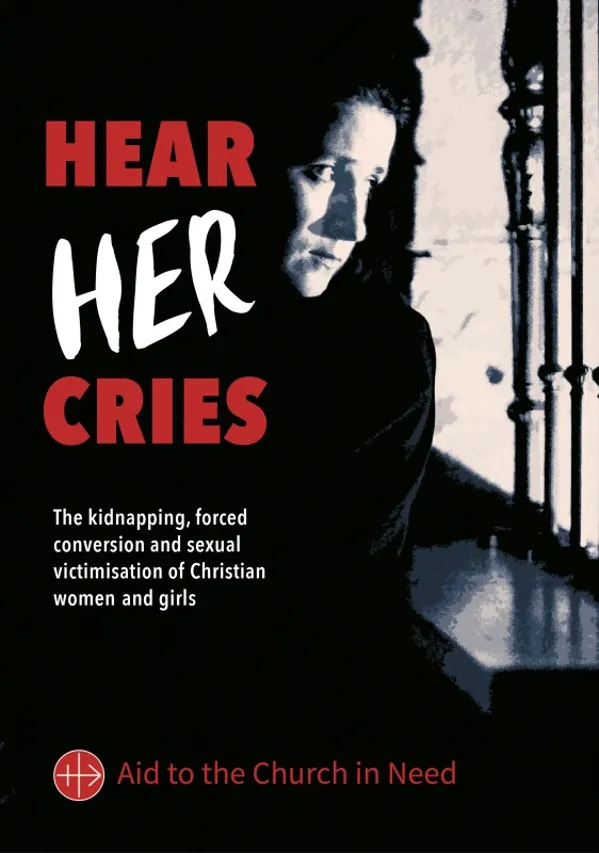New Report Declares Treatment of Christian Minority Women and Girls a ‘Human Rights Catastrophe’
The study found numerous cases of forced kidnapping and exploitation in Egypt, that Christians account for 95% of women and girls seized by Islamists in Nigeria, and that 70% of those forcibly converted and married in Pakistan are Christians.

LONDON — A report issued on Wednesday declared the treatment of Christian minority women and girls in parts of Africa, the Middle East, and South Asia a “human rights catastrophe.”
The study, “Hear Her Cries,” published by the charity Aid to the Church in Need (ACN) on Nov. 24, said that, “at its most extreme,” forced conversions could amount to “genocide.”
The report, released on Red Wednesday, an annual commemoration raising awareness of anti-Christian persecution, highlighted cases in countries including Egypt and Pakistan.
It also focused on Nigeria, which was controversially removed from this year’s U.S. State Department watchlist of countries with the most egregious violations of religious freedom.
The study found numerous cases of forced kidnapping and exploitation in Egypt, that Christians account for 95% of women and girls seized by Islamists in Nigeria, and that 70% of those forcibly converted and married in Pakistan are Christians.
ACN described the report as “the first of its kind to focus on the phenomenon of young women who are seized, because both their sex and religion makes them vulnerable to abduction and assault.”
Michele Clark, a human rights advocate who has studied the plight of Coptic Christian women, told CNA on Nov. 24 that the report was significant because it revealed the scope of the problem.
“I think the report makes a very important contribution, because it expands the focus on these abductions, forced conversions, forced marriages, from just single country reports to a much broader, much more global perspective,” said Clark, a retired adjunct professor of international affairs at George Washington University, in a phone interview.
“We can pick this up and realize, ‘Wow, this is not just happening in one place.’ This is happening in many, many places around the world. It’s happening in the Middle East. It’s happening in Central Asia. It’s happening in Africa. And so shedding a light on the scope of the problems is a very important contribution.”
The report was compiled by ACN’s U.K. branch, which has launched a petition calling for action to stop the sexual enslavement of Christian women.
The text was presented at an online event chaired by the human rights campaigner Caroline Cox. Speakers included Michele Clark and Fiona Bruce, the British Prime Minister’s Special Envoy for Freedom of Religion or Belief.
The report, which includes case studies from Egypt, Iraq, Syria, Mozambique, Nigeria, and Pakistan, said that “evidence suggests that the coronavirus pandemic has provided the perfect breeding ground for acts of sexual violence.”
“Research showed that vulnerable converts in lockdown with their families are at a greater risk of general abuse, especially in the Middle East and North Africa region,” it noted.
The report argued that “instances of systemic abduction, sexual violence, forced marriage and conversion of Christian women in countries such as Nigeria, Iraq and Syria can be categorized as genocidal by nature.”
It recalled that one element of the 1948 Convention on the Prevention and Punishment of the Crime of Genocide is the existence of “measures intended to prevent births within the group.”
“There is thus a link between the girls and young women who are the focus of this study and the convention, which categorizes genocide as ‘acts committed with intent to destroy in whole or in part, a national, ethnical, racial or religious group,’” the report said.
Clark told CNA that her own experience of documenting abuses committed against Coptic women in Egypt suggested that the problem was growing.
“There is definitely an increase in reported caseload,” she said. “There’s also an interesting increase in asylum applications outside of Egypt for young women who are fleeing for fear of abductions, and forced conversions, and forced marriages. And these asylum applications are being accepted in host countries because it’s a recognized phenomenon.”
“So I’m seeing that, very slowly, very gradually, there is a recognition that this is an issue that needs to be treated seriously, and that it needs to be addressed, because of the deep, deep personal tragedies that are represented in every single case.”
Around 10% of Egypt’s estimated 104 million population is Christian, with around 90% belonging to the Coptic Orthodox Church, which is part of the Oriental Orthodox communion and traces its roots to St. Mark the Evangelist.
The country’s Christians suffer various forms of discrimination. A report earlier this month said that teachers at a school in Minya Governorate, Upper Egypt, ordered Christian students not to wear crosses, while inflicting violence on the schoolchildren.
The ACN study said the Egyptian authorities were “highly dismissive” of cases of forced abduction and conversion of Christian women.
It quoted a former member of a kidnapping gang that targetted Coptic girls, who described how the abductions were “meticulously orchestrated” and led to the girls being passed to Salafist groups that forced them to convert.
“The former gang member also stated that kidnappers are paid handsomely by these groups, and that police officers have conspired to report these young women as missing rather than abducted,” said the report, which added that incidents were under-reported in the media.
Clark said she was hopeful that governments were beginning to take the problem seriously.
“The acknowledgment of other governments is absolutely essential. We can’t allow perpetrators to think that they can continue with impunity and that nobody really cares what they’re doing,” she said.
Asked how individual Christians could contribute to ending the exploitation of women and girls, she said: “The power of prayer, first, is so important in what we do. And then when you move beyond that, I would suggest that you become informed [about the situation].”
“I know that in the United States, we have Coptic women who have been asylees. These are families and young women which can benefit from friendship and support. Find out what is going on in your own particular community. Are there families that can benefit from a friend? This is a very important step in any kind of recovery process and feeling whole again.”

















